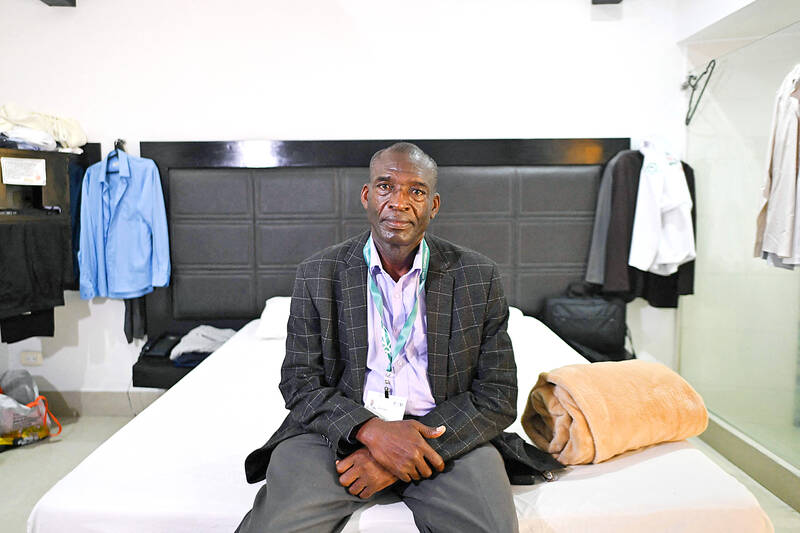Aggrey Rwetsiba, a Ugandan delegate to the UN Biodiversity Conference of the Parties (COP16) to the UN Convention on Biological Diversity in Colombia, finds himself in unusual accommodations: a motel normally destined for trysts, with rooms featuring sex swings and stripper poles.
Like other visitors to the Colombian city, his hotel booking fell through, and Rwetsiba had to make last-minute arrangements.
With traditional hotels bursting at the seams, hourly rate motels came to the rescue of stranded delegates like himself.

Photo: AFP
Showing Agence France-Presse (AFP) around his room in the Motel Deseos (“Desires”), the delegate points to the large double bed, walk-in shower and an unusual feature: a ceiling mirror.
Some of his clothes are draped on hangers from the shower screen, others are folded up in a small cubicle with one door inside the room and another that opens on the hallway.
Usually rented out for a few hours at a time, there are no wardrobes in the rooms. The double-doored cubicle is for staff to pass drinks to guests seeking seclusion.

Photo: AFP
“I’m not sure whether I’ve got the full understanding of what a motel should be, but I have seen some unique features ... like the mirror on the ceiling. I have never seen [that] in a hotel,” Rwetsiba said.
He also pointed to the lone wall socket next to the bed, rather than by the table where he needs to power his laptop.
“So the setup is quite different,” he said. “I have never seen a hotel with each room having a parking yard,” each enclosed, with a private door leading straight into the room.

Photo: AFP
Motel Deseos manager Diana Echeverry proudly showed AFP around the facility, with 40 rooms spread over two floors, and one wing set aside for a dozen COP16 delegates.
In the rest of the building, rooms feature such amenities as whirlpool baths, “Kama Sutra” loungers and dance poles.
“We have adapted our establishment a little in order to be able to host the guests of COP16 and foreigners,” Echeverry said.
Contacted at short notice by local authorities, she said the motel quickly worked out a daily rate — 150,000 pesos (US$34.63) per night — and introduced a breakfast service.
Room prices usually range from 65,000 to 100,000 pesos for three hours.
Staff also “took out the love swings, ‘love machines,’ Kama Sutra chairs and left the rooms without those kinds of items,” Echeverry said.
The biodiversity summit has been good for business, she added.
“It has ensured that the [delegates’] rooms are occupied during those days and ... the remaining rooms now rotate much more to meet the demands of our usual guests.”
Cali Mayor Alejandro Eder told reporters this week the city’s hotels were “100 percent” full, with Airbnbs, houses and apartments also rented out.
Initial expectations had been for 12,000 to 15,000 people to attend the COP16, but in the end, there were closer to 23,000 registered delegates, Eder said.
The Cali Chamber of Commerce said the city has 166 registered motels — more than anywhere else in Colombia.
Like elsewhere in Latin America, motels are generally places go to for a few private hours with a lover.
In Cali, they boast names such as “Kama Sutra,” “Cupido” and “Extasis.” Delighted with the amenities at Motel Deseos, Rwetsiba said he informed other colleagues, and there were now five Ugandan delegates in rooms “more comfortable” than many traditional hotels.
“It’s ... spacious. That’s why we are here. We are not complaining,” he said with a big smile. “We are all happy.”

Intel Corp chief executive officer Lip-Bu Tan (陳立武) is expected to meet with Taiwanese suppliers next month in conjunction with the opening of the Computex Taipei trade show, supply chain sources said on Monday. The visit, the first for Tan to Taiwan since assuming his new post last month, would be aimed at enhancing Intel’s ties with suppliers in Taiwan as he attempts to help turn around the struggling US chipmaker, the sources said. Tan is to hold a banquet to celebrate Intel’s 40-year presence in Taiwan before Computex opens on May 20 and invite dozens of Taiwanese suppliers to exchange views

Application-specific integrated circuit designer Faraday Technology Corp (智原) yesterday said that although revenue this quarter would decline 30 percent from last quarter, it retained its full-year forecast of revenue growth of 100 percent. The company attributed the quarterly drop to a slowdown in customers’ production of chips using Faraday’s advanced packaging technology. The company is still confident about its revenue growth this year, given its strong “design-win” — or the projects it won to help customers design their chips, Faraday president Steve Wang (王國雍) told an online earnings conference. “The design-win this year is better than we expected. We believe we will win

Chizuko Kimura has become the first female sushi chef in the world to win a Michelin star, fulfilling a promise she made to her dying husband to continue his legacy. The 54-year-old Japanese chef regained the Michelin star her late husband, Shunei Kimura, won three years ago for their Sushi Shunei restaurant in Paris. For Shunei Kimura, the star was a dream come true. However, the joy was short-lived. He died from cancer just three months later in June 2022. He was 65. The following year, the restaurant in the heart of Montmartre lost its star rating. Chizuko Kimura insisted that the new star is still down

While China’s leaders use their economic and political might to fight US President Donald Trump’s trade war “to the end,” its army of social media soldiers are embarking on a more humorous campaign online. Trump’s tariff blitz has seen Washington and Beijing impose eye-watering duties on imports from the other, fanning a standoff between the economic superpowers that has sparked global recession fears and sent markets into a tailspin. Trump says his policy is a response to years of being “ripped off” by other countries and aims to bring manufacturing to the US, forcing companies to employ US workers. However, China’s online warriors